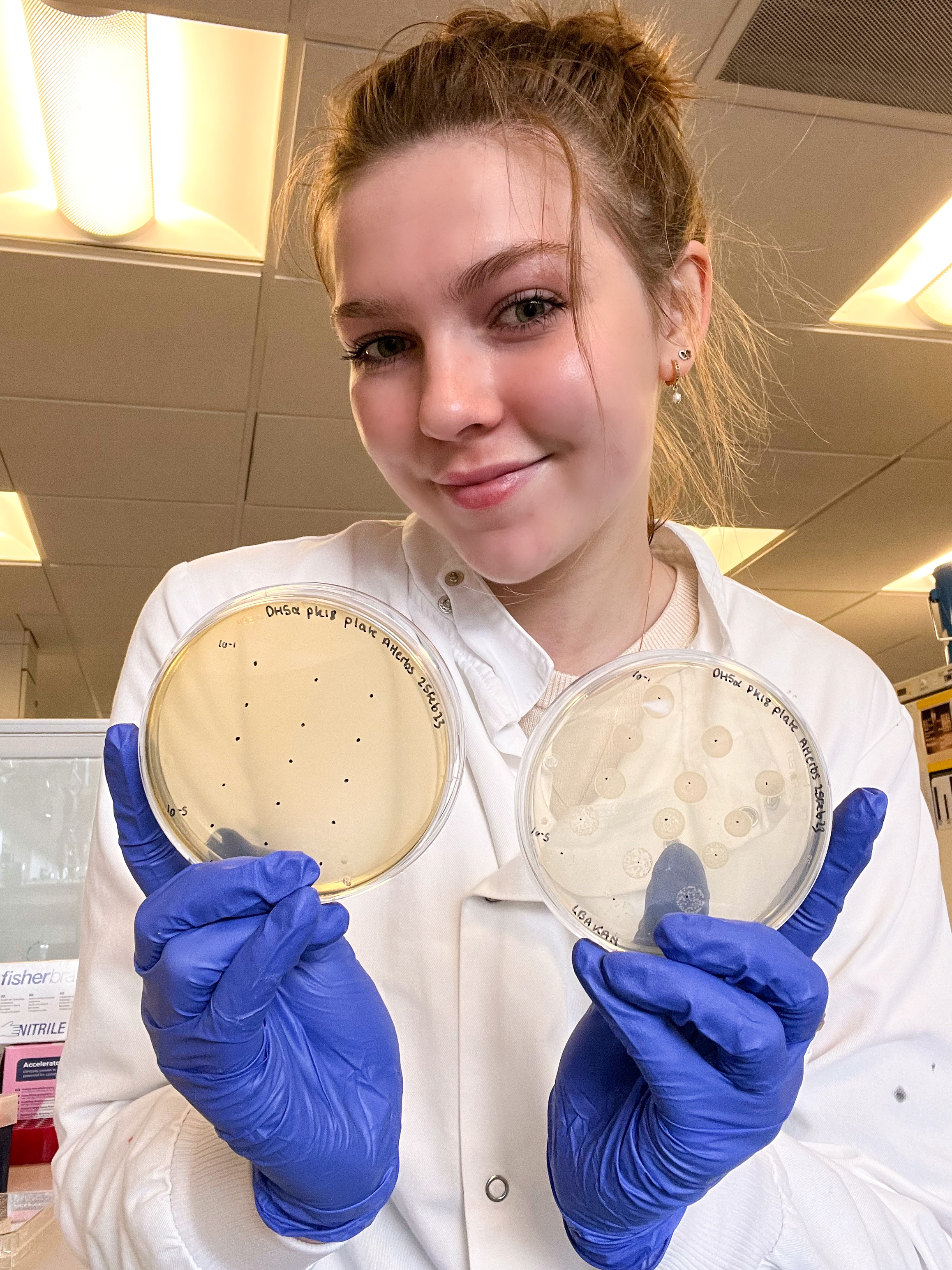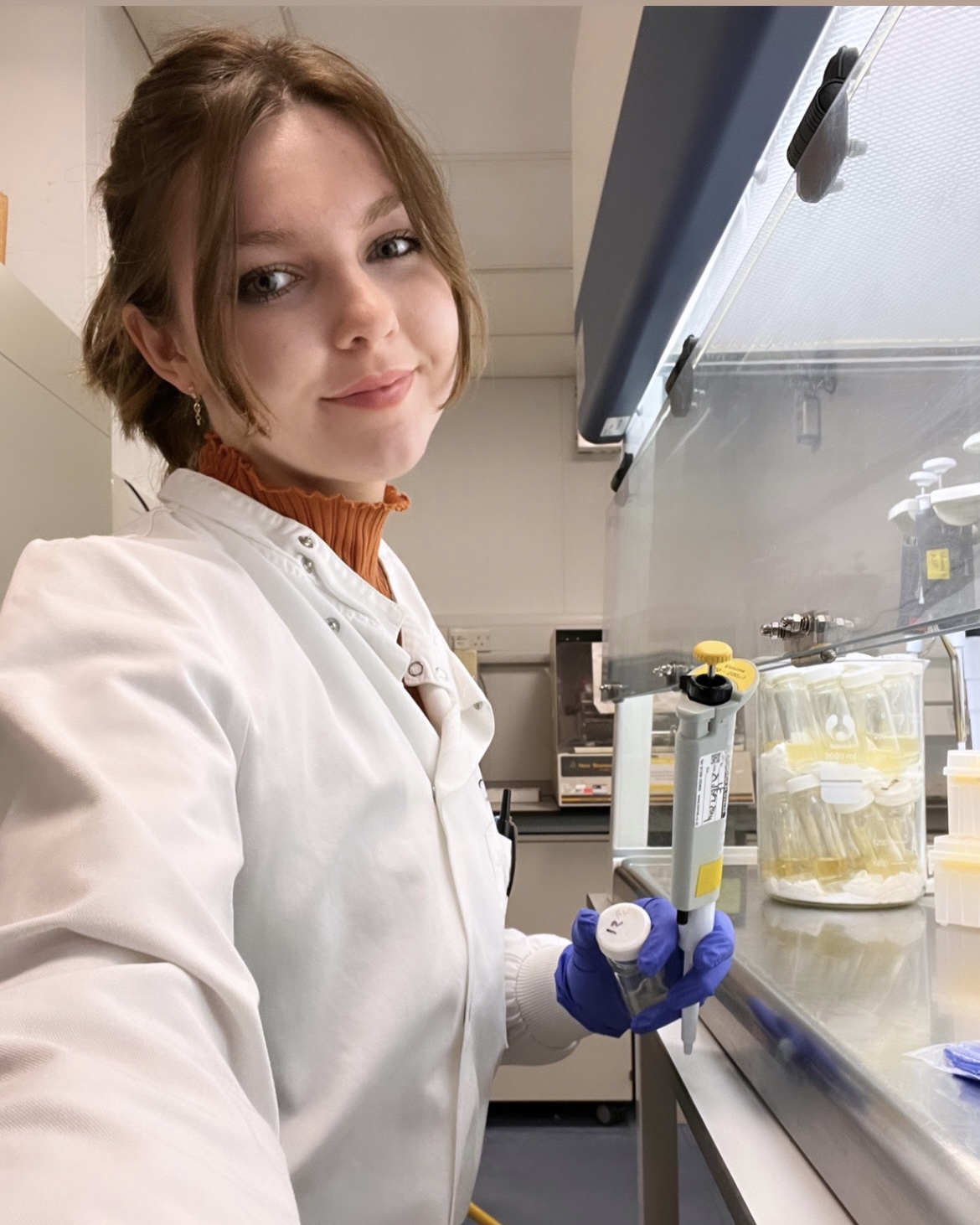Social media for URSS
Read about how students have used social media to engage the public with their URSS research projects.

Arianwen Herbert @scienceformymum
I'm an MBio Biochemistry student here at the University of Warwick. I was awarded a bursary by the URSS to extend my undergraduate research in the summer between my third and fourth years of study. Read on to find out how I used social media for the public engagement element of the URSS, and then carried on into my fourth year.
My experience of using social media for engagement
At the time of writing (April 2023), I’m a 4th year MBio Biochemist at the University of Warwick. My mum doesn’t have a scientific background but, as my greatest supporter and inspiration, once I joined my lab, each day she would patiently ask what I’d been doing and whether my experiments had ‘worked’. It drove me mad! So I started to vlog my days in the lab and send that to her to feed her interest. Bear with me as the relevance of this will soon become clear!
I was awarded a grant by the URSS to extend my undergraduate research and, on discovering one of the conditions was to undertake public engagement activity, there was no doubt in my mind that social media would be my tool of choice. With only 6 weeks available I chose TikTok, as distribution of posts doesn’t depend on an established group of followers in the way other platforms do. With TikTok it was possible to jump on trends to make my messages accessible, starting with the hours of material I’d accrued vlogging to my mum! And thus @scienceformymum was born, with an emphasis on clear and accessible science communication to the informed and uninformed equally.
I think many will identify when I say I’ve long had a love/hate relationship with social media, having been on the receiving end of its positive and negative aspects. Like every great idea throughout history, there are always those lurking in the shadows ready to use and abuse a concept to fit their agenda. But to those who dismiss the value of social media I’d say think again. We all love a meme, but if we stop scrolling aimlessly and take time to explore positive sources and actively engage with content providers we identify with and who will engage with us in return the algorithm will change things for us in a heartbeat. I’ve discovered a lifetime of book titles for my reading list, recipes for my meal planning and created a bucket list of experiences I’m determined to complete in my lifetime, along with a plethora of personal tips that make these things feel achievable. It’s this sense of direction and engagement that turns social media from a pointless time waster into something of value.
Accumulating followers and expanding to Instagram
The reaction to @Scienceformymum was amazing, with one post accruing 20k views in just my second week. I quickly found could barely keep up with the variety of questions posed, on line and via my inbox. I also noticed that the same group of people were regularly engaging and asking to be tagged in responses so that they didn’t miss out. And there was no sign of it stopping come the end of the 6 week URSS period so I continued. It was then that I made the decision to switch to Instagram to provide greater continuity and opportunity for engagement. I launched this account on January 1st 2023 and accumulated over 20,000 followers within the first 10 weeks. I continue to populate my TikTok account, but try to keep things shorter and simpler, as the algorithm seems to prefer this. I then dovetail feedback from TikTok into my Instagram account, though believe the most engaged followers have migrated to the Instagram account.
Who is my audience and how do I keep them engaged?
With both Instagram and TikTok it can be tricky to tell who your audience is and you are always at the mercy of the algorithm. I think the key to making it work lies in engaging directly and thoughtfully with followers to ensure you’re giving them content that’s of real value to them. In that respect, engaging with questions is as, if not more, important than new content.
Most followers fall into one of two categories (if we exclude the inevitable bots, which I try to weed out but there seems to be no real solution to this yet). The first is undergrads and high school students, from all around the world, who want to better understand what it’s like to study Biochemistry and how they can best prepare for their future. Many are interested in or are current undergrads at Warwick. The second group is the broader community of SciCommers including PhD students, postdocs and industry scientists who are an amazing source of encouragement, inspiration, advice and solidarity.
Ultimately, this is a beneficial community on so many levels. My inbox is always full of questions and requests for advice from students a few years behind me, and these are my favourite kinds of interactions. I can support by giving insight into questions such as Biology vs Biochem vs Biomed, what preliminary subjects should be studied, what prior experience would be useful, resources they’ll need, and what to expect. Then there’s more generic questions like what’s it like at Warwick, which accommodation to choose, what are the options for further education or employment going forward. And finally the inevitable questions specifically aimed at better understanding what I’m doing in my videos and more information on protocols and processes.
Valuable community
For my part, this develops and directs me personally by making me think about what I’m doing and why, and how to best break down and articulate my research for those who have less experience than me at the same time as those who have significantly more. In addition, there’s a huge amount of communication between those of us running similar accounts, many of whom support me in answering questions when I’m busy or don’t know the answer. So I’m also making valuable connections every day. What started as a ‘requirement’ is now a source of information that not only provides value and direction to others but is a source of significant value to me.
Top tips
My top tip for content and direction is to simply think back to things that our younger selves would have been interested in or would have found useful to know, if only we’d known the right questions to ask. Whether we’re at master’s or PhD level, it’s not so long ago that we can’t remember what it was like to have all this ahead of us. Though I secured some great placements prior to coming to university, I know I would have been fascinated to see more of the inner workings of a real-life research lab while debating my future. Things that now seem everyday and mundane to us will be novel to those outside of our unique environment.
My second tip would be to stay relatable and personable. Let your personality and humanity shine through and don’t worry about being too polished – social media is made for the unfiltered and realistic. The mistakes we make teach us more than the things that go right first time.

